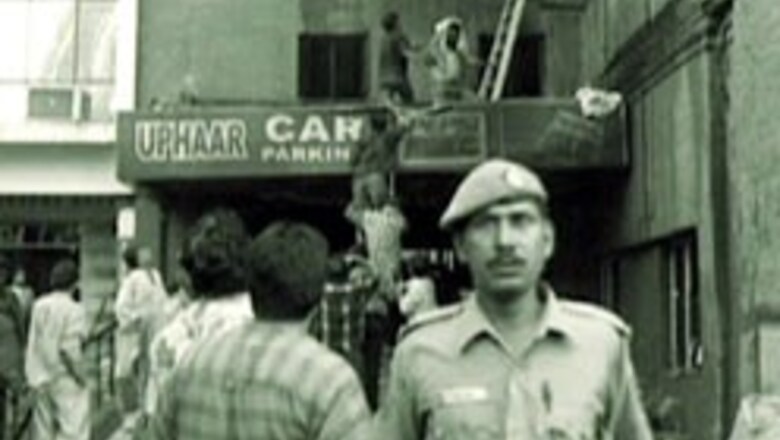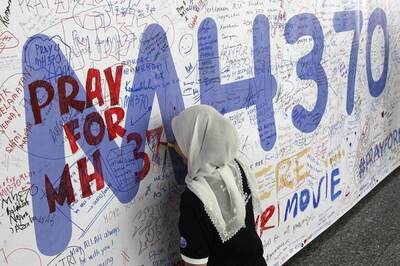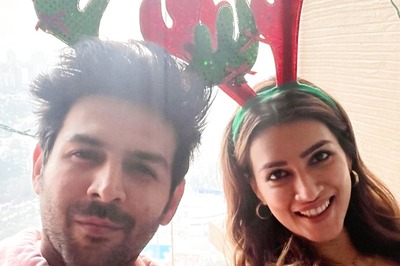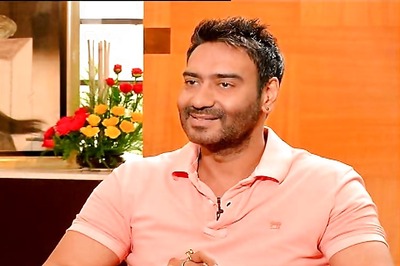
views
A Delhi sessions court on Tuesday pronounced the much-awaited verdict in the Uphaar cinema hall fire case. November 20 makes it 10 years five months and seven days. You may think the numbers are irrelevant – but for those that lost their loved ones in the Uphaar Cinema fire in June 1997, it’s only the numbers they've been left with. Here’s the timeline of the tragic case.
Uphaar Tragedy: A Timeline
June 13, 1997: Tragedy strikes Delhi's Uphaar cinema. It was the first day after the renovated Uphaar cinema was thrown open to the public. A fire started by a faulty transformer during the screening of the film Border. This leads to mayhem and stampede inside the theatre. Fifty-nine people were suffocated to death while 109 survived with injuries and memories to scar them forever. There was also oil leakage and the fire spilled over to the parking lot gutting 27 parked cars.
June 15, 1997: Police lodge first information report at the Hauz Khas police station. Within a week, the case is transferred to the Crime Branch of Delhi Police.
June 30, 1997: Thirty families who lost their loved ones form the Association of the Victims of the Uphaar Tragedy (AVUT).
July 22, 1997: The theatre owners, Sushil Ansal and his son Pranav, are arrested in Mumbai by Crime Branch and brought to Delhi the following day.
July 24, 1997: Government transfers the case from Crime Branch to the Central Bureau of Investigation (CBI).
Nov 15, 1997: CBI completes its probe into the case and files chargesheet in the court of Metropolitan Magistrate Brijesh Sethi against 16 accused, including Uphaar theatre owners and real estate tycoons Sushil and Gopal Ansal.
Jan 4, 1999: Case committed for trial to sessions court after one year, one month and 18 days, following 30 hearings.
March 3, 1999: Additional Sessions Judge (ASJ) LD Malik begins hearing the case. In 36 hearings, the CBI and defence counsel for 13 of the 16 accused complete arguments on the issue of framing of charges, an important pre-trial stage.
Nov 1, 1999: ASJ Malik proceeds on leave.
Jan 3, 2000: ASJ Malik is transferred to different court.
Jan 10, 2000: The case is assigned to ASJ Mamta Sehgal, who decides to hear afresh arguments on the issue of framing of charges.
Feb 10, 2000: The CBI's plea for day-to-day hearing refused, allowing bi-weekly hearings.
July 12, 2000: Senior public prosecutor B.L. Kalra withdraws from the case. Two days later Y.K. Saxena is appointed as public prosecutor.
July 31, 2000: The Delhi High Court takes up the hearing of a criminal writ petition filed by AVUT against the tardy progress in the trial.
Aug 16, 2000: The high court directs the trial court to expedite the framing of charges within two months i.e. by Oct 16, 2000.
Aug 16, 2000: ASJ Mamta Sehgal begins hearing arguments on the framing of charges on day-to-day basis till Oct 14, 2000.
Nov 7, 2000: AVUT plea for expeditious trial of the case comes up for hearing in the Delhi High Court again. A division bench directs ASJ Sehgal to complete arguments on framing of charges within three weeks and matter is adjourned till Dec 8, 2000.
Feb 27, 2001: Judge Sehgal begins framing charges against all 16 accused.
April 9, 2001: The process of framing of charges against all accused is completed.
April 9, 2001: The Ansal brothers and eight others approach Delhi High Court against framing of charges against them.
May 23, 2001: ASJ Sehgal begins formal trial, starts recording prosecution evidence.
Aug 28, 2001: High court dismisses plea by two accused government officials against the framing of charges.
Sept 11, 2001: The high court dismisses Ansals' plea, challenging the framing of charges against them.
April 4, 2002: AVUT plea for expeditious trial comes up before the high court yet again. The trial court is specifically asked to hold trial 10 days in a month from May 2002 and asked to grant no adjournment on the plea of non-availability of defence counsel. Also asked to complete the trial by Dec 15, 2002.
Jan 08, 2003: The high court again asks trial court to expedite proceedings.
PAGE_BREAK
Jan 31, 2004: Some court documents pertaining to the case goes missing. Court orders probe.
Despite repeated directions by the high court for early conclusion of the trial, the case proceeds at a snail's pace till 2005.
Jan 10, 2005: Sushil Ansal moves high court against a trial court order.
Jan 19, 2005: The high court directs the trial court to proceed with recording of the statement of the accused. It asks the accused persons to raise their objection in regard to either lack of proof or non-admissibility of the documents.
March 1, 2005: The high court disposes Sushil Ansal's plea with the direction that objection if any will be made at the time of the final arguments.
Nov 11, 2005: Recording of statement of defence witnesses commences.
March 7, 2006: AVUT moves high court for registration of criminal case over tampering of court documents.
May 5, 2006: The high court accedes to AVUT plea for lodging case over missing documents.
May 17, 2006: Delhi Police lodges the FIR.
Aug 2, 2006: Defence evidence closed (Only three defence witnesses were produced in a span of 10 months.)
Aug 9, 2006: Uphaar theatre inspected by ASJ Mamta Sehgal.
Sept 26-28, 2006: Former solicitor general Harish Salve concludes the final arguments for CBI.
Jan 06, 2007: K.T.S. Tulsi files the written submission on behalf of AVUT in pursuance of the trial court order dated 19.12.2006
Feb 14, 2007: Defence counsel commenced their final arguments.
May 18, 2007: AVUT moves Delhi High Court for completion of trial within a time frame.
May 31, 2007: The high court directs speedy trial yet again.
Aug 21, 2007: The trial court finally reserves its judgement.


















Comments
0 comment